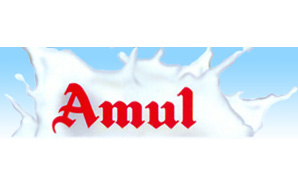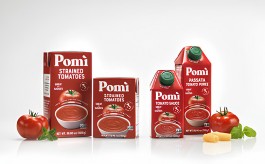Amul turnover grows 14% to cross Rs 20K crore in FY15
By Pray Jani | Vjmedia Works | May 15, 2015
The cooperative's turnover has grown by 159% in the last five years; aims to touch Rs 50K cr by 2020
 The country's largest dairy cooperative, and for that matter the largest player in India's food business, Gujarat Cooperative Milk Marketing Federation (GCMMF) that owns the Amul brand, has crossed the Rs 20,000 crore mark in turnover in FY15. The Anand-headquartered food major that announced its results today, reported a turnover of Rs 20,733 crore during 2014-15, up 14 per cent over its last year's turnover of Rs 18,150 crore.
The country's largest dairy cooperative, and for that matter the largest player in India's food business, Gujarat Cooperative Milk Marketing Federation (GCMMF) that owns the Amul brand, has crossed the Rs 20,000 crore mark in turnover in FY15. The Anand-headquartered food major that announced its results today, reported a turnover of Rs 20,733 crore during 2014-15, up 14 per cent over its last year's turnover of Rs 18,150 crore.The results of the apex body of dairy cooperatives was declared on Thursday in the 41st Annual General Meeting (AGM). During the last five years, turnover of GCMMF grew from Rs 8,005 crore to Rs 20,733 crores, a remarkable growth of 159 per cent. The cumulative average growth rate (CAGR) has been that of 21 per cent. In fact, the group turnover of GCMMF and its constituent member unions, representing unduplicated turnover of all products sold under Amul brand was Rs 29000 crores or $ 4.6 billion.
GCMMF has grown by 51 per cent in the last two years, banking on new product launches and innovation. A GCMMF statement here said that as many as 26 new products from Amul's portfolio were launched last year.
Commenting on the results, Jethabhai Patel, chairman, GCMMF said, "Based on estimated growth in market demand for Amul products and our future marketing efforts, we anticipate at least 20 per cent CAGR growth in the business of GCMMF during the next five years, implying that the turnover of GCMMF should exceed Rs 50,000 crores ($ 8 billion) by the year 2019-20."
Patel also informed that Amul plans to enhance its milk processing capacity from the current level of 23.7 million litres per day (mlpd) to 38 mlpd in the next five years.
He elborated on the federation's expansion plans in the coming years. Amul's new milk powder plant started functioning in Palanpur in 2014. With capacity of 120 tonnes per day, this is Amul's largest milk powder plant, till date. Similarly, a new dairy plant at Rohtak started operations, further augmenting Amul's capacity to serve the markets of Delhi and NCR, besides a new butter plant at Gandhinagar with capacity of 40 tonnes per day.
Another ten new dairy plants are in various stages of completion. New dairy plants are being built in Faridabad, Kanpur, Lucknow and Kolkatta. Another new dairy plant in Varanasi is also in pipeline. The mega-cheese plant near Palanpur is near completion and will start operating this year.
"Since we are also doubling cheese manufacturing capacities at our existing plant, the net impact will be three-fold expansion in our cheese capacities. Within Gujarat, new dairy plants will soon be operational at Amreli and Surendranagar. Capacity expansion at Bhavnagar is also underway. A new dairy plant will also start in Kutch. These large-scale mega-expansion projects are part of our Mission 2020 plan," the chairman added.
R S Sodhi, managing director said, "During the last five years, our milk procurement has witnessed an increase of 65 per cent. This enormous growth in milk procurement was a result of high milk procurement price paid to our farmer-members which has increased by 75 per cent during last five years. High remunerative milk procurement price to farmers has helped us to win back farmer's interest in milk production. Better returns from dairying have obviously motivated farmers to enhance their investments in increasing milk production."
Sodhi also pointed out that while Amul has ensured that milk procurement price to its farmer-members increased by 75 per cent in the last five years, in other countries of the world such as New Zealand and EU, price of milk to farmers has fallen sharply in recent years.
In New Zealand alone, milk price to farmers has declined by 40 per cent in last one year. Similarly across Europe, farm-gate milk prices have declined by 18-20 per cent in one year alone. Dairy farmers in US have also seen their farm-gate milk prices drop by 15-19 per cent in the same period.
Due to softening in import demand for dairy products, especially in China and higher production in major exporting countries, there has been a major meltdown in global prices of dairy commodities in last one year. Farm-gate prices of milk continue to fall in countries such as Australia, New Zealand and EU nations, which are heavily dependent on dairy exports.
Amul feels that in order to dump their surplus stocks of dairy commodities, these countries are lobbying hard for access to Indian dairy market through bilateral Free Trade Agreement (FTA) negotiations. "We request our policy makers to ensure that dairy products are completely kept out of the ambit of FTAs with major dairy exporting nations. No duty concessions and no GI protection on dairy products should be given to countries such as Australia, New Zealand and EU. These steps will go a long way towards ensuring that our nation's self sufficiency in dairy sector is maintained in future and our food-security is safeguarded with respect to milk and dairy products," Sodhi said.
Advertisement








